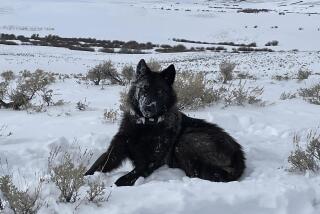Way Cleared for Interior to Raise Grazing Fees
- Share via
WASHINGTON — The Clinton Administration and its Senate allies ended a weeks-long deadlock over a controversial grazing reform initiative Tuesday, shelving a proposal that would have written into law new environmental protections and increases in fees that ranchers pay to graze their livestock on federal land.
Sen. Harry Reid (D-Nev.), facing a phalanx of opposition from fellow Westerners, withdrew a measure that would have raised grazing fees by 80%.
The move, following weeks of parliamentary maneuvering, paves the way for the Clinton Administration to issue its own federal regulations, including even larger fee increases than those envisioned in Reid’s legislation.
In August, Interior Secretary Bruce Babbitt presented a grazing reform proposal that included a 230% increase in grazing fees. He has said since that, in the interests of getting Congress’ stamp of approval on grazing reform, he would be willing to relax some elements of the package, including the fee increase. But he has always contended that the Administration could issue new rules for grazing without seeking congressional approval.
Ranchers now pay a rate of about $1.86 a month per “animal unit month” to graze five sheep or a cow and her calf on most of the 272 million acres of grassland owned by the federal government. Babbitt’s proposal would raise the rates to $4.28 over three years.
Government studies have concluded that inexpensive access to federal lands has led to overgrazing in many places, which in turn has eroded stream beds, stripped grasslands of plant life and threatened the habitats of dwindling species. As a result, environmentalists--and now the Clinton Administration--have led a lengthy effort to change a system of land management that some call “cowboy welfare.”
Ranchers, however, have charged that Babbitt’s proposals will drive many cattlemen and sheepherders out of business, effectively ending a way of life in the rural West.
Senators who led the opposition to Reid’s amendment said that the Nevadan’s decision to withdraw it was a victory for their side. Sen. Pete V. Domenici (R-N.M.) and Sen. Malcolm Wallop (R-Wyo.), said that they have asked the Senate Energy and Natural Resources Committee to conduct hearings on the issue.
But the Clinton Administration declared that it will proceed with plans to increase fees and institute reforms through a lengthy rules-making process.
Domenici warned, however, that use of the regulatory process could pose new problems for the Administration, opening its grazing reform package to court challenges from grazing communities. Charging that Babbitt has become an advocate exclusively for environmentalists, Domenici said that cattlemen and sheepherders can and will employ the same tactics that environmental groups have used for years to block or delay developments that they claim harm the environment.
“When the shoe is on the other foot, there’s plenty of litigation, and it takes a long time,” said Domenici. “I don’t know why the ranchers won’t do the same.”
Interior Department spokesman Kevin Sweeney countered that, before proposing its reform package, the Interior Department called five hearings to allow communities to express their views on grazing reform and received written comments on the issue. They were attended by 4,000 people, while another 2,000 submitted written comments, he said.
More to Read
Get the L.A. Times Politics newsletter
Deeply reported insights into legislation, politics and policy from Sacramento, Washington and beyond. In your inbox twice per week.
You may occasionally receive promotional content from the Los Angeles Times.











